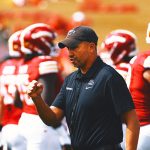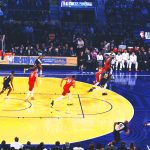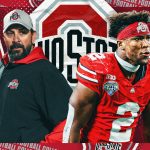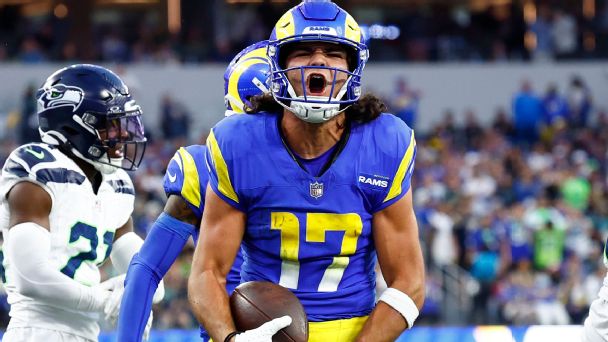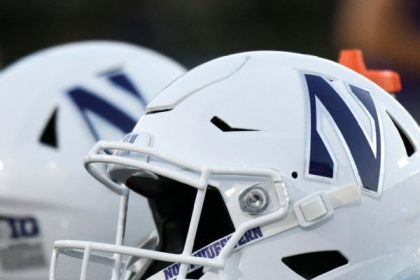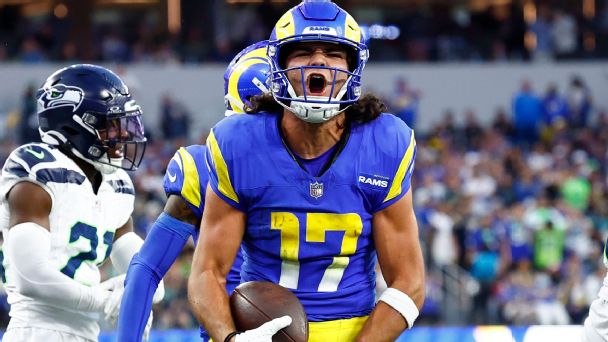
Editor’s note: This story was originally published Dec. 21.
AS PENINA NACUA thought about the challenges preventing her from making it to her son Puka Nacua‘s first NFL game, she began to pray.
The Los Angeles Rams rookie wide receiver is the second youngest of six children, and his younger brother, Tei, plays high school football in Utah. Penina, a single mother since her husband, Lionel, died in 2012, couldn’t figure out a way for Tei to be able to play in his game on Friday and go to practice on Saturday as well as not miss her work shift on Monday if she traveled to see Puka’s game on that second Sunday in September.
“My heart was broken because he was playing in his first NFL game,” Penina said. “How does a mom miss that opportunity?”
Penina prayed to Lionel and her mother, Fa’aTamali’i S. Tafua, asking them to “please be there with Puka. I can’t make it out.”
Lionel died from complications of diabetes 15 days before Puka turned 11. Puka’s grandmother died from ovarian cancer in 2021.
“There was no doubt in my mind, they were there,” Penina said. “Because he was balling. So, I just literally knew. I was like, ‘See, your angels are there.'”
Puka caught 10 passes for 119 yards that day at Lumen Field in Seattle, setting the Rams’ franchise record for receiving yards in a first career game. Doing it in front of The 12s — the Seahawks‘ nickname for their fans — also held a special meaning for the wideout.
Twelve is his “family number,” the one he wore in high school and college, and the one most of his siblings have worn.
“I remember telling [Cooper Kupp], ‘Man, I know they mentioned it’s going to be loud, and it’s going to be crazy, but I’m like, ‘They don’t know,” Puka Nacua said. “Twelve. I’m 12. I’m like, ‘That’s me.’ I’m so excited. That’s who I am. They’re cheering. Everybody came to cheer to support me.'”
When Nacua, 22, called his mom after the Seahawks game, the first thing he told her was, “I literally felt dad and grandma with me.'”
As he takes the prime-time stage on Thursday when the Rams host the New Orleans Saints (8:15 p.m. ET, Prime Video), Nacua has 1,163 receiving yards and needs 311 more to break the NFL’s rookie receiving record. In Week 2, Nacua set the league’s single-game record for receptions by a rookie (15), propelling himself into the NFL Offensive Rookie of the Year conversation. He hit the 1,000-yard receiving mark 12 games into his career, and he already has a franchise record for receiving yards for a rookie.
Nacua has emerged as perhaps the biggest surprise of the Rams’ season, but the mother who raised him and the siblings who grew up with him have known for a while what teammates are coming to find out this year.
“The Seattle game is kind of a microcosm of what the season has been for him. He’s just done a great job of answering the bell,” said Kupp, who missed the first four games on injured reserve. “When things haven’t gone well, he’s just been able to get back in the huddle and play the next snap.
“That’s a testament to Puka and his mentality.”
TOUGHNESS WAS INSTILLED in Nacua from a young age. He grew up admiring his four brothers and watching everything they did, especially on the football field. Nacua and his siblings spent a lot of time in the backyard playing football — and beating up on Puka.
“Oh, my goodness,” his brother Samson said. “We used to demolish this kid. Every chance we’d get, we were just probably lobbing the ball in the air. … So, literally every chance we got, he was either the tackling dummy or really just helping us out to train us. … It was drill after drill. Lining up Oklahoma drills, even in a backyard with each other, and just really going at it.”
A few years before Lionel died, he was standing in the end zone watching Puka play in a youth football game when Penina walked over. Lionel turned to Penina and whispered, “He’s going to be the best one out of all the boys.”
Puka heard that story many times growing up. But even knowing that sentiment, he said he didn’t feel added pressure because, as he realized from watching his brothers, there was “a game plan.”
“My mom always has told me this and I knew as a kid, my father and my mom believed that I would be the one to kind of make it,” he said.
It was not only those backyard sessions that shaped Puka but what he saw when his siblings played in games.
“I wanted to be what I saw,” he said.
And what he saw? From Samson, “the fluidness and the art side of the game.” And from his brothers Isaiah, a safety, and Kai, a defensive end, “the destructive, powerful, rough part of the game of football.”
“I saw those two worlds, and I was like, ‘Oh, there’s a possibility to do both,'” Puka said.
He has married the skill sets beautifully in his rookie season, never more evident than against the Cleveland Browns in Week 13, when he made a twisting catch down the sideline, one Rams coach Sean McVay called “unbelievable.” As he spun through the air, he was hit by a defender and fell on the ball. It knocked the wide receiver out of the game temporarily, but he came back and threw a block on his first play.
AFTER PLAYING THE first two seasons of his college career for the Washington Huskies, Puka Nacua felt a pull back toward Utah, the place his family moved after his father died so that his mother could be closer to her support system. He had spent much of the pandemic with his family there and even daydreamed with his brother Samson, then a member of the Utah Utes, about playing football together again.
The dream stuck with Puka and came to fruition after his sophomore season when he and Samson transferred to BYU — the place they’d grown up watching siblings Kai and Isaiah play for the Cougars and where Nacua was “the little kid who played in the end zone” and was the first to volunteer to be a ball boy. And by going back, Puka and Samson knew they could be there for their mom as she cared for their ailing grandmother.
“We knew what it was like to lose a parent,” Puka said, “but in a completely different way of doing the hospice with my grandma and how that experience definitely took a toll on our family.”
Puka Nacua shined at BYU. He worked with wide receivers coach Fesi Sitake, who became a mentor. Like Nacua, Sitake lost a parent at a young age. Sitake’s mother died when he was in high school. In Nacua, Sitake saw “a kid that’s trying to navigate his way through college and through life amidst the trials and everything he was going through.”
“Even though our circumstances weren’t the exact same,” Sitake said, “I just remember what that was like, and I wanted him to understand that I knew that and that it’s OK if he struggled and if he failed and if he was unsure. He handled it really well. And he’ll admit too he had a lot of struggles because there comes a lot of pressure with that.”
In 21 games over two seasons, Nacua led the Cougars in receiving yards, finishing with 91 catches for 1,430 yards and 11 touchdowns.
Sitake taught Nacua “how to be a pro,” BYU offensive coordinator Aaron Roderick said. At Washington, Nacua was “really raw,” according to Roderick.
“They kept expecting him to be the man, and he had some injury problems, but I also think he had some homesickness and his family with his grandma and his mom,” Roderick said. “And I think he also had a lot of growing up to do. And Fesi is the one that I give the credit to for teaching Puka how to be a pro, how to take care of his body, how to put down your video games and go to bed on time. You’ve got to eat right. You’ve got to operate like a professional, because you’re going to be one if you do what I tell you to do.”
THAT DEVELOPMENT AT BYU led to the Rams drafting Nacua in the fifth round in April. When McVay was asked earlier this month what he liked about Nacua during the pre-draft process, the coach said, “Everything that you’re seeing.”
“If we were to say that we knew he would be this good, then we would not have waited as long as we did,” McVay joked.
Not only did the Rams see Nacua’s toughness on film, they saw that his football acumen “was really high before you even talked to him based on the versatility of his game,” McVay said.
One of Nacua’s strengths is visualization, something he said he learned from his dad when they started watching highlights of Lawrence Taylor and Earl Campbell. It’s something Nacua said is huge for him.
And while that visualization typically takes place as he is looking through the call sheet, Nacua speaks to his dad and grandma during the national anthem as he prepares for his opportunity to show them who he has become.
“I don’t know exactly what my dad would say or how he feels when he’s watching these games, but I know every time I go out there, I’m trying to prove to him that hopefully that he thinks I’m doing a good job and that he’s getting a cool seat to watch it,” Nacua said. “[That] the sacrifices and everything’s paid off.”

